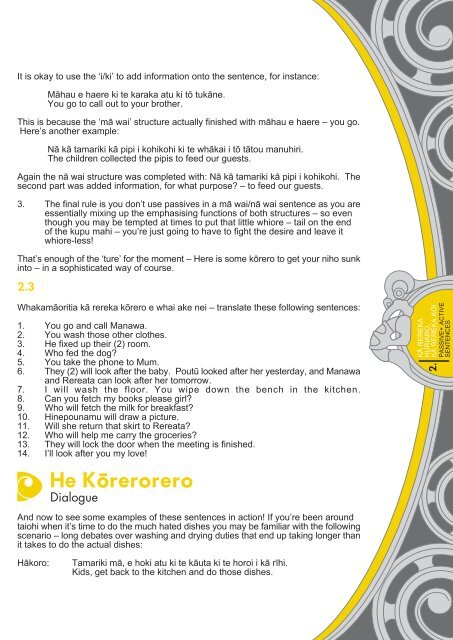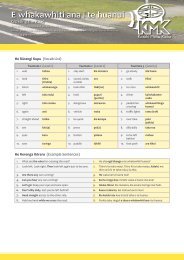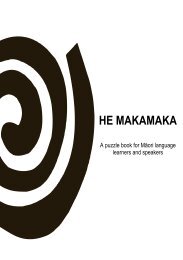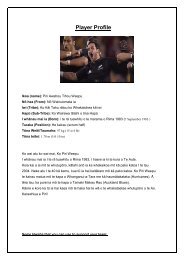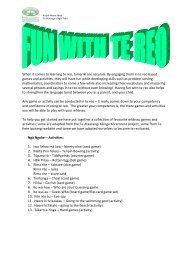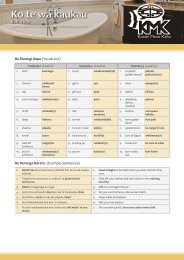Te Hū o Moho Book 4 - Te Pirere - Kotahi Mano Kaika
Te Hū o Moho Book 4 - Te Pirere - Kotahi Mano Kaika
Te Hū o Moho Book 4 - Te Pirere - Kotahi Mano Kaika
Create successful ePaper yourself
Turn your PDF publications into a flip-book with our unique Google optimized e-Paper software.
It is okay to use the ‘i/ki’ to add information onto the sentence, for instance:<br />
Mähau e haere ki te karaka atu ki tö tukäne.<br />
You go to call out to your brother.<br />
This is because the ‘mä wai’ structure actually finished with mähau e haere – you go.<br />
Here’s another example:<br />
Nä kä tamariki kä pipi i kohikohi ki te whäkai i tö tätou manuhiri.<br />
The children collected the pipis to feed our guests.<br />
Again the nä wai structure was completed with: Nä kä tamariki kä pipi i kohikohi. The<br />
second part was added information, for what purpose? – to feed our guests.<br />
3. The final rule is you don’t use passives in a mä wai/nä wai sentence as you are<br />
essentially mixing up the emphasising functions of both structures – so even<br />
though you may be tempted at times to put that little whiore – tail on the end<br />
of the kupu mahi – you’re just going to have to fight the desire and leave it<br />
whiore-less!<br />
That’s enough of the ‘ture’ for the moment – Here is some körero to get your niho sunk<br />
into – in a sophisticated way of course.<br />
2.3<br />
Whakamäoritia kä rereka körero e whai ake nei – translate these following sentences:<br />
1. You go and call Manawa.<br />
2. You wash those other clothes.<br />
3. He fixed up their (2) room.<br />
4. Who fed the dog?<br />
5. You take the phone to Mum.<br />
6. They (2) will look after the baby. Poutü looked after her yesterday, and Manawa<br />
and Rereata can look after her tomorrow.<br />
7. I will wash the floor. You wipe down the bench in the kitchen.<br />
8. Can you fetch my books please girl?<br />
9. Who will fetch the milk for breakfast?<br />
10. Hinepounamu will draw a picture.<br />
11. Will she return that skirt to Rereata?<br />
12. Who will help me carry the groceries?<br />
13. They will lock the door when the meeting is finished.<br />
14. I’ll look after you my love!<br />
He Körerorero<br />
Dialogue<br />
And now to see some examples of these sentences in action! If you’re been around<br />
taiohi when it’s time to do the much hated dishes you may be familiar with the following<br />
scenario – long debates over washing and drying duties that end up taking longer than<br />
it takes to do the actual dishes:<br />
KÄ REREKA<br />
HURIARO,<br />
KÄ REREKA KOI<br />
PASSIVE+ ACTIVE<br />
SENTENCES<br />
2.<br />
Häkoro:<br />
Tamariki mä, e hoki atu ki te käuta ki te horoi i kä rïhi.<br />
Kids, get back to the kitchen and do those dishes.


